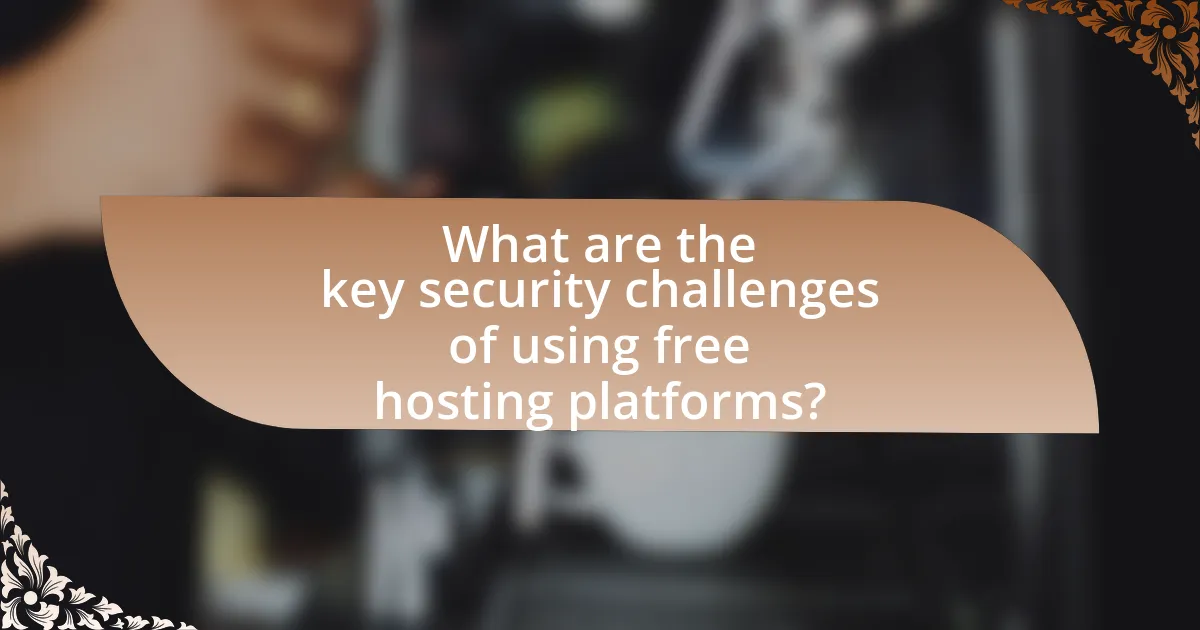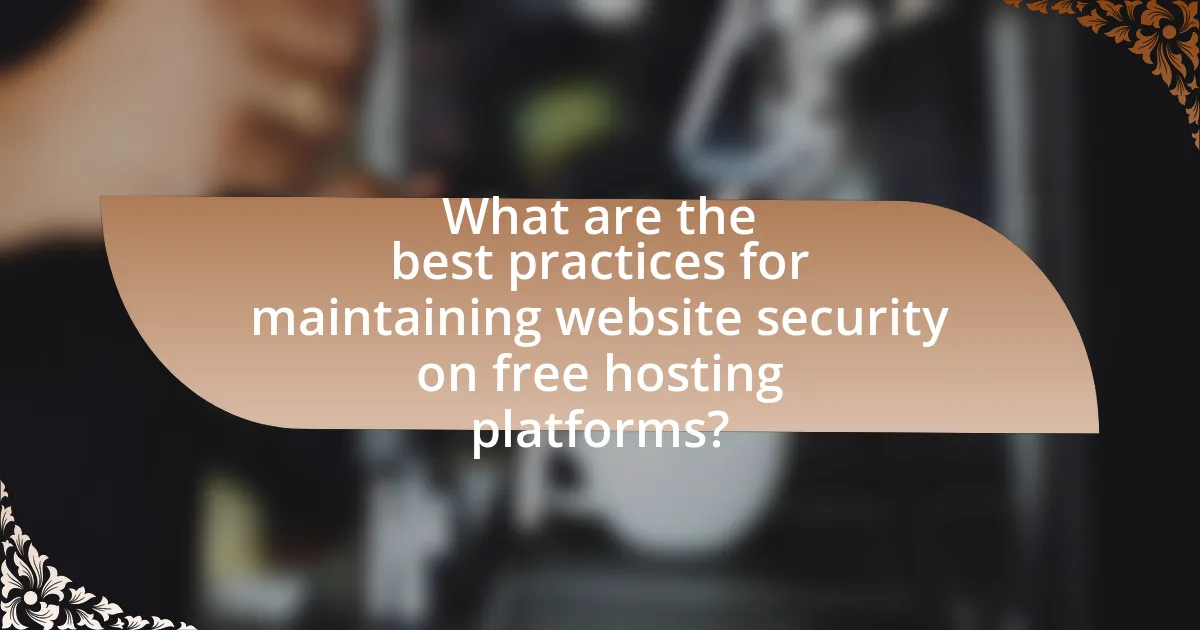The article focuses on securing websites hosted on free hosting platforms, highlighting the key security challenges associated with these services, such as limited control over server security and increased vulnerability to cyberattacks. It contrasts the security features of free hosting with those of paid services, emphasizing the lack of essential protections like SSL certificates and regular updates. The article outlines common vulnerabilities, the impact of inadequate support, and the importance of website security for all users. Additionally, it provides practical steps for enhancing security, including implementing strong passwords, enabling HTTPS, and utilizing security tools, while also addressing the significance of regular audits and updates to mitigate risks effectively.

What are the key security challenges of using free hosting platforms?
The key security challenges of using free hosting platforms include limited control over server security, lack of robust data protection measures, and increased vulnerability to cyberattacks. Free hosting services often do not provide adequate security protocols, leaving websites susceptible to malware, hacking, and data breaches. For instance, a study by the Cybersecurity & Infrastructure Security Agency (CISA) highlights that free hosting platforms frequently lack encryption and regular security updates, which are essential for safeguarding sensitive information. Additionally, shared resources on these platforms can lead to cross-site vulnerabilities, where one compromised site can affect others on the same server.
How do free hosting platforms differ from paid hosting in terms of security?
Free hosting platforms generally offer lower security compared to paid hosting services. This difference arises because free hosting providers often lack advanced security features such as SSL certificates, regular backups, and robust firewalls, which are typically included in paid plans. For instance, a study by HostingAdvice found that 70% of free hosting services do not provide adequate protection against malware and hacking attempts, making websites hosted on these platforms more vulnerable. In contrast, paid hosting services invest in comprehensive security measures, including DDoS protection and proactive monitoring, which significantly enhance the overall security of hosted websites.
What vulnerabilities are commonly found in free hosting services?
Common vulnerabilities found in free hosting services include inadequate security measures, lack of regular updates, and shared resources that can lead to cross-site scripting (XSS) and SQL injection attacks. Free hosting providers often do not implement robust security protocols, making websites hosted on these platforms susceptible to breaches. For instance, a study by the University of California, Berkeley, highlighted that many free hosting services fail to apply timely security patches, leaving users exposed to known vulnerabilities. Additionally, the shared nature of resources in free hosting environments can allow attackers to exploit one compromised site to affect others, increasing the risk of data theft and service disruption.
How does the lack of support impact website security on free hosting?
The lack of support significantly undermines website security on free hosting platforms. Without dedicated technical assistance, users may struggle to implement essential security measures, such as timely software updates and vulnerability patches. For instance, a study by the Ponemon Institute found that 60% of data breaches occur due to unpatched vulnerabilities, highlighting the critical need for ongoing support in maintaining security. Additionally, the absence of expert guidance can lead to misconfigurations, which can expose websites to attacks like SQL injection or cross-site scripting. Therefore, the lack of support directly correlates with increased risks and potential security breaches on free hosting services.
Why is website security important for all users?
Website security is crucial for all users because it protects sensitive information from unauthorized access and cyber threats. When websites lack proper security measures, users are at risk of data breaches, identity theft, and financial fraud. According to a report by Cybersecurity Ventures, global cybercrime damages are projected to reach $10.5 trillion annually by 2025, highlighting the increasing threat landscape. Additionally, secure websites enhance user trust and credibility, as 85% of consumers will abandon a purchase if they feel their data is not secure. Therefore, implementing robust security protocols is essential for safeguarding user data and maintaining a safe online environment.
What are the potential risks of an unsecured website?
An unsecured website poses several potential risks, including data breaches, malware infections, and loss of user trust. Data breaches can occur when sensitive information, such as personal details or payment information, is transmitted without encryption, making it vulnerable to interception by cybercriminals. According to a report by Verizon, 43% of data breaches involve small businesses, highlighting the significant risk for unsecured sites. Additionally, malware can be injected into unsecured websites, leading to further security threats for users and damaging the website’s reputation. Finally, users are less likely to trust a website that lacks security measures, which can result in decreased traffic and revenue.
How can a security breach affect your online reputation?
A security breach can severely damage your online reputation by eroding trust among users and stakeholders. When sensitive data is compromised, customers may perceive your brand as unreliable or negligent, leading to a decline in user engagement and loyalty. According to a study by IBM, the average cost of a data breach is $4.24 million, which reflects not only financial losses but also the long-term impact on brand perception. Furthermore, negative media coverage following a breach can amplify reputational damage, as seen in high-profile cases like Equifax, where the breach led to a significant drop in consumer trust and stock value.

What steps can you take to secure your website on free hosting platforms?
To secure your website on free hosting platforms, implement strong passwords, enable HTTPS, and regularly update software. Strong passwords reduce the risk of unauthorized access; using a combination of letters, numbers, and symbols is recommended. Enabling HTTPS encrypts data transmitted between the user and the server, protecting sensitive information. Regularly updating software, including plugins and themes, addresses vulnerabilities that could be exploited by attackers. According to a study by the Ponemon Institute, 60% of data breaches are linked to unpatched vulnerabilities, highlighting the importance of timely updates.
How can you implement basic security measures?
To implement basic security measures, utilize strong passwords, enable two-factor authentication, and regularly update software. Strong passwords should include a mix of letters, numbers, and symbols, making them difficult to guess; studies show that 81% of data breaches are due to weak passwords. Enabling two-factor authentication adds an extra layer of security by requiring a second form of verification, significantly reducing the risk of unauthorized access. Regularly updating software ensures that vulnerabilities are patched, as outdated software is a common target for cyberattacks.
What role does strong password management play in website security?
Strong password management is crucial for website security as it directly prevents unauthorized access to sensitive data and systems. Effective password management practices, such as using complex passwords, regularly updating them, and employing password managers, significantly reduce the risk of breaches. According to a 2020 report by Verizon, 81% of hacking-related breaches involved stolen or weak passwords, highlighting the importance of robust password strategies in safeguarding online platforms. By ensuring that passwords are unique and difficult to guess, website owners can protect their sites from common attack vectors, thereby enhancing overall security.
How can you utilize SSL certificates for free hosting?
You can utilize SSL certificates for free hosting by obtaining them from providers like Let’s Encrypt, which offers free SSL certificates that can be easily integrated into various hosting platforms. Many free hosting services support Let’s Encrypt, allowing users to secure their websites without incurring costs. The process typically involves generating a certificate through the hosting control panel or using command-line tools, followed by configuring the web server to use the SSL certificate. This method ensures that data transmitted between the user’s browser and the server is encrypted, enhancing security and trustworthiness.
What advanced security practices should you consider?
To enhance security on free hosting platforms, consider implementing practices such as regular software updates, strong password policies, and the use of HTTPS. Regularly updating software mitigates vulnerabilities, as outdated systems are prime targets for attacks; for instance, 60% of breaches are linked to unpatched vulnerabilities. Strong password policies, including the use of multi-factor authentication, significantly reduce unauthorized access risks, as 81% of hacking-related breaches involve stolen or weak passwords. Additionally, employing HTTPS encrypts data in transit, protecting sensitive information from interception, which is crucial given that 43% of cyberattacks target small businesses.
How can regular updates and backups enhance your website’s security?
Regular updates and backups significantly enhance a website’s security by ensuring that software vulnerabilities are patched and that data can be restored in case of a breach. Keeping software, plugins, and themes updated minimizes the risk of exploitation by cybercriminals, as outdated systems are often targeted due to known vulnerabilities. For instance, a report by the Cybersecurity & Infrastructure Security Agency (CISA) indicates that 60% of breaches involve known vulnerabilities that could have been mitigated through timely updates. Additionally, regular backups provide a safety net, allowing website owners to quickly recover their data and restore functionality after an attack, thereby reducing downtime and potential data loss. This dual approach of updates and backups creates a robust defense against various security threats.
What security plugins or tools are available for free hosting platforms?
Security plugins and tools available for free hosting platforms include Wordfence, Sucuri Security, and iThemes Security. Wordfence offers a firewall and malware scanner, providing real-time threat defense. Sucuri Security focuses on website monitoring and malware removal, ensuring ongoing protection. iThemes Security enhances security through features like two-factor authentication and brute force protection. These tools are widely recognized for their effectiveness in safeguarding websites hosted on free platforms, as evidenced by user reviews and industry recommendations.

What are the best practices for maintaining website security on free hosting platforms?
To maintain website security on free hosting platforms, implement strong passwords and enable two-factor authentication. Strong passwords reduce the risk of unauthorized access, while two-factor authentication adds an extra layer of security by requiring a second form of verification. Regularly update software and plugins to patch vulnerabilities, as outdated systems are prime targets for attacks. Additionally, utilize HTTPS to encrypt data transmitted between the user and the website, protecting sensitive information from interception. Regularly back up website data to ensure recovery in case of a security breach. Monitoring website traffic for unusual activity can also help identify potential threats early. These practices collectively enhance security and mitigate risks associated with free hosting environments.
How can you monitor your website for security threats?
To monitor your website for security threats, implement a combination of security tools and practices. Utilize web application firewalls (WAFs) to filter and monitor HTTP traffic, which can help detect and block malicious activities. Regularly scan your website with security plugins or services that identify vulnerabilities, malware, and unauthorized changes. Additionally, set up alerts for suspicious activities, such as multiple failed login attempts or unusual traffic spikes, which can indicate potential threats. According to a report by Cybersecurity Ventures, cybercrime is projected to cost the world $10.5 trillion annually by 2025, highlighting the importance of proactive monitoring for security threats.
What tools can help you detect vulnerabilities in your website?
Tools that can help detect vulnerabilities in your website include OWASP ZAP, Nessus, and Burp Suite. OWASP ZAP is an open-source web application security scanner that identifies security vulnerabilities in web applications. Nessus is a widely used vulnerability scanner that provides comprehensive assessments of network security, including web applications. Burp Suite is a popular tool among security professionals for web application security testing, offering features like scanning for vulnerabilities and intercepting web traffic. These tools are validated by their widespread use in the cybersecurity community and their effectiveness in identifying vulnerabilities, as evidenced by numerous case studies and user testimonials.
How often should you conduct security audits on your website?
You should conduct security audits on your website at least quarterly. Regular audits help identify vulnerabilities and ensure compliance with security standards. According to the 2021 Cybersecurity Report by Cybersecurity Ventures, 60% of small businesses that experience a cyber attack go out of business within six months, highlighting the importance of frequent security assessments. Additionally, the National Institute of Standards and Technology (NIST) recommends regular audits as part of a comprehensive security strategy to mitigate risks effectively.
What common mistakes should you avoid when securing your website?
Common mistakes to avoid when securing your website include neglecting regular software updates, using weak passwords, failing to implement HTTPS, and not backing up data. Regular software updates are crucial because outdated systems can have vulnerabilities that hackers exploit; for instance, 60% of breaches are linked to known vulnerabilities that could have been patched. Weak passwords make it easier for attackers to gain unauthorized access; using complex passwords can reduce this risk significantly. Implementing HTTPS is essential for encrypting data transmitted between users and the server, as unencrypted connections can be intercepted. Lastly, not backing up data can lead to irreversible loss in case of a cyber attack; statistics show that 30% of companies that suffer a major data loss go out of business within a year.
How can neglecting updates lead to security issues?
Neglecting updates can lead to security issues by leaving software vulnerable to known exploits. When updates are not applied, security patches that address vulnerabilities are missed, allowing attackers to exploit these weaknesses. For instance, according to a report by the Cybersecurity and Infrastructure Security Agency (CISA), 85% of successful cyberattacks exploit known vulnerabilities for which patches are available. This statistic underscores the critical importance of timely updates in maintaining security.
What are the dangers of using default settings on free hosting platforms?
Using default settings on free hosting platforms poses significant security risks, including vulnerability to cyberattacks and data breaches. Default configurations often lack essential security measures, making websites susceptible to exploitation by hackers. For instance, many free hosting services do not enforce strong password policies or regular software updates, which are critical for protecting against unauthorized access. Additionally, default settings may expose sensitive information, such as database credentials, to the public. According to a study by the Ponemon Institute, 60% of data breaches are linked to misconfigured settings, highlighting the importance of customizing security settings to mitigate these risks.
What practical tips can help you secure your website effectively?
To secure your website effectively, implement HTTPS by obtaining an SSL certificate, which encrypts data between the user and the server, ensuring secure communication. Additionally, regularly update your website’s software, including plugins and themes, to protect against vulnerabilities; for instance, outdated WordPress plugins are a common entry point for attackers. Use strong, unique passwords for all accounts associated with your website, as weak passwords can be easily compromised; a study by Verizon found that 81% of hacking-related breaches involve stolen or weak passwords. Finally, regularly back up your website data to recover quickly in case of a security breach, as having recent backups can significantly reduce downtime and data loss.
How can you educate yourself about the latest security threats?
To educate yourself about the latest security threats, regularly follow reputable cybersecurity news sources and blogs, such as Krebs on Security and the SANS Internet Storm Center. These platforms provide timely updates on emerging threats and vulnerabilities. Additionally, participating in online courses and webinars offered by organizations like Cybrary or Coursera can enhance your understanding of current security issues. Research studies, such as the Verizon Data Breach Investigations Report, offer statistical insights into prevalent threats, reinforcing the importance of staying informed. Engaging with cybersecurity communities on forums like Reddit or specialized groups on LinkedIn can also facilitate knowledge sharing and awareness of the latest security trends.
What resources are available for ongoing website security education?
Ongoing website security education resources include online courses, webinars, and industry publications. Platforms like Coursera and Udemy offer courses specifically focused on website security, while organizations such as the SANS Institute provide webinars and training sessions. Additionally, websites like OWASP (Open Web Application Security Project) offer extensive documentation and resources on web security best practices. These resources are validated by their widespread use in the cybersecurity community and their alignment with current security standards and practices.










